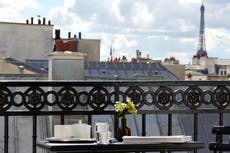How this Middle East rock climbing group is bringing more women into adventure sports
Anyone who has been rock climbing knows the gratification it can offer. Now, thanks to an incredible group’s hard work, women from the Middle East and North Africa are taking to the tough-but-rewarding rockface of the Egyptian valleys, writes Tamara Davison, building community, supporting each other and finding a footing in a male-dominated sport

Your support helps us to tell the story
From reproductive rights to climate change to Big Tech, The Independent is on the ground when the story is developing. Whether it's investigating the financials of Elon Musk's pro-Trump PAC or producing our latest documentary, 'The A Word', which shines a light on the American women fighting for reproductive rights, we know how important it is to parse out the facts from the messaging.
At such a critical moment in US history, we need reporters on the ground. Your donation allows us to keep sending journalists to speak to both sides of the story.
The Independent is trusted by Americans across the entire political spectrum. And unlike many other quality news outlets, we choose not to lock Americans out of our reporting and analysis with paywalls. We believe quality journalism should be available to everyone, paid for by those who can afford it.
Your support makes all the difference.Looking up at the granite wall before me, I feel a mix of nerves and excitement as I tie my harness to the rope. Here, in the rugged wadis – an Arabic word for a deep valley carved into the mountain – surrounding Egypt’s Dahab, the ancient rock faces are giving life to a small but vibrant community of rock climbers.
It’s also a place where women from across the Middle East and North Africa (Mena) are now starting to find their footing in adventure sports.
After the final safety checks with my belayer, I chalk my hands, grip the rock face and start my ascent. New muscles spring into action as I climb, while my mind carefully pieces together the puzzle of the holds and ledges in front of me.
Surrounding me, I can hear other climbers tackling their routes alongside the encouraging calls of the team below. The sense of support among the group is palpable. Frustration, excitement, fear, and exhilaration ring out as the women scale the desert walls. What unites the group are the small victories, the camaraderie and a sense of shared empowerment after a long day’s climb.

Women in the Wadi (WITW) is a female-led climbing group based in Egypt’s Sinai Peninsula which makes these experiences possible. Co-founded by two of Egypt’s first female rock climbing instructors, Amira Helmy and Menna Emad, as well as British climber Gen Morris, it’s transforming the region’s adventure sports landscape by unlocking accessibility for women in an area where it’s been traditionally difficult.
“Yes, we are Middle Eastern, but we're not the typical kind of Middle Eastern. We're stepping out of that shell,” Helmy says.
Globally, rock climbing is still a male-dominated sport – fewer than a quarter of the world’s climbers are women, according to a 2020 survey. While female participation in “extreme” activities is on the rise, cultural expectations and fewer opportunities slow down the potential of this growth for women in Mena. However, WITW is helping to rewrite the story of who belongs on the rock.
Read more: Meet the women blazing a trail through the majestic mountains of Morocco
For Helmy, it started with a desire to show other women how climbing can make them feel. “I felt it was a healing journey for me,” the US-Egyptian climber says. “As a woman, you struggle a lot; you’re always in survival mode when you wake up in the morning, and you put on that kind of armour. When I’m in the mountains and climbing, I’m just free.”
There were few expectations at first, but the group’s inaugural climbing event in January 2021 attracted over 20 women. Clearly, there was a genuine desire among the community to climb – they just needed someone to show them how. What started as an opportunity to unite those interested in outdoor adventures around Dahab quickly became a thriving international community.
WITW now hosts regular climbing events, meetups, and overnight retreats, drawing climbers from Egypt, Saudi Arabia, Jordan, and a growing international community interested in Egypt’s climbing routes. Their sessions are sometimes combined with yoga or movement therapy that builds on the goal of creating connections between the climbers. It’s also led to international events, with the group’s first overseas retreat taking place in Turkey.
As an Egyptian woman, climbing makes me feel strong. It calms me down even though it can be challenging
Most excursions currently take place in winter in the wadis surrounding Dahab, offering a mix of sport climbing routes perfect for beginners all the way to advanced climbers. Climbing with the organisation in these locations is about more than just endurance or completing the routes, too.
“I’ve had some people get quite emotional on the wall, especially when they manage to get to the top, which isn’t always the aim,” Morris says. “They feel a sense of achievement. We really accept any form of expression… any frustration is fine, like not being able to make something is also okay. We facilitate and hold that space for people.”

Read more: We need more to see women in adventure travel – this expedition is a good place to start
In addition to encouraging freedom of expression, the team is driven by another major goal: connecting with Arab women. They’ve adjusted courses to make climbers feel comfortable and even asked the team’s male drivers to leave the area for more privacy. Since then, the number of climbers from Mena has steadily grown.
“I wanted to build a kind of community for women to be free and to move freely on the rock. A safe space where even women wearing hijabs, with a veil, could take it off and climb,” Helmy explains.
This approach has helped inspire Egyptian women to discover and explore their own capabilities alongside their peers, and helped others step into roles as outdoor guides. “As an Egyptian woman, climbing makes me feel strong. It calms me down even though it can be challenging,” May Elshamy, one of the group’s regular climbers, says.
“Finding a community of women climbers made it so easy for me to keep climbing and to keep loving this sport. When we are gathered together to head to the wadi to climb, we don’t feel like we’re competing with each other. It’s more about having fun, enjoying the climbs, reminding ourselves to breathe.”
Building such a supportive community, however, hasn’t been without challenges. Helmy says the group initially faced pushback from the local authorities, and some people in the surrounding community were sceptical. “They couldn’t believe it. It wouldn’t register in their head like a woman is doing this,” Helmy says. “They would see a foreigner doing it, but not an Egyptian woman.”

Given the small size of Egypt’s rock climbing scene, it’s equally as difficult to buy gear such as harnesses, ropes, and climbing shoes in the country. Instead, most gear is donated and brought in via people’s suitcases.
Despite these setbacks, WITW continues to attract attention from the global climbing community and is helping to develop and grow Egypt’s climbing and adventure tourism scene.
As a result of the group’s continued growth, WITW eventually started introducing mixed-gender events to show what a more conscious and less competitive climbing community could look like. With inclusivity and diversity at their core, it felt like a natural next step. “We’re trying to create a space for women to be outdoor guides and show that everyone can be part of this,” Morris explains, adding that male climbers also need to see this in action.
WITW’s efforts to overcome cultural barriers and create a more inclusive climbing community in Egypt, regardless of gender, religion or skin colour, add to larger goals for adventure sports in the Middle East. “It’s about creating a female community of climbers that can start to know one another and broaden their horizons,” says Morris.
To find out more about Women in the Wadi visit Womeninthewadi.com.
Read more: Lucy Shepherd on surviving jungle wilderness – and redefining the explorer



Join our commenting forum
Join thought-provoking conversations, follow other Independent readers and see their replies
Comments